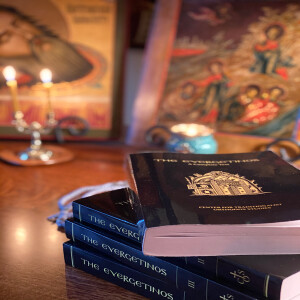Tonight in our reading of The Evergetinos we concluded Hypothesis 15 and read the entirety of Hypothesis 16. Both have a similar focus: our natural loves and affections for others or the things of this world are to be set aside for the love of God in the kingdom. We must acknowledge that all things begin and end with God and all things come to us from His hand. Simply put - all is grace and our acknowledgment of this truth should give us a kind of freedom to set aside or worldly attachments be they bad or good. Once again, we are presented with multiple illustrative stories that challenge our sensibilities. We see individuals who heroically struggle to let go of worldly ties, not because they are evil but in order to be able to embrace not just the greater good but that which is eternal. Even that which is good, even our virtues must be perfected by the grace of God. In many different ways we can be willful; we can choose paths, even those that are religious in nature, because they appeal to her sensibilities rather than being clearly something that God demands. We must let go of the illusion that we are the source of life and salvation. It is a particularly modern notion of creating a better world or acting to bring about societal change as the object of the deepest aspiration of a person’s life. All that we read from the lives of the Saints shows that they see things through the lens of God’s revelation of Himself to us in His Son. Our dignity and destiny as human beings is found in Christ and it is Him that we must seek and devote ourselves to completely. It is only when all things are subordinated to Him that we come to see our lives and others with a kind of clarity.
---
Text of chat during the group:
00:09:01 Rachel: Oh darn, Im too late! lol
00:11:41 Daniel Allen: Where are we at?
00:11:58 Carol Nypaver: 123
00:44:03 Rachel: I LOVE that story! Because I am a twin, so I understand very much!
00:45:02 Rachel: Wait, weren't they twin brother and sister? I could be wrong...
00:45:33 renwitter: Yes :-)
00:52:38 Anthony: This story also indicates that the monastics were not completely cut of from their families....St. Ioannikos had to have known of his brother-in-law's rage for him to pray for his brother-in-law.
00:54:34 Rachel: :)
01:00:07 jack: Their human dignity
01:01:30 Rachel: Please share the talk by Kallistos Ware!🙏🏼
01:02:10 Anthony: This disfigurement of the image of ChristI think distinguishes our understanding of sin from _Total Depravity_ of the Calvinists.
01:03:00 Rachel: WOw, wow, wow! Thank you!!
01:03:12 Erick Chastain: that's great!
01:08:15 Erick Chastain: which book by Mectilde de bar are you reading now?
01:08:17 Rachel: Oh my goodness. One of my favorite readings.
01:08:33 renwitter: Breviary of Fire
01:08:42 Erick Chastain: thanks
01:09:17 Daniel Allen: What caryll hauls lander book was that quote from?
01:10:46 Carol: I think it may be Rocking-Horse Catholic
01:12:29 Daniel Allen: Thanks
01:13:44 Rachel: I had never heard Fr. Abernathy's interpretation but the one Anthony stated. I don't think they conflict though, as the intention of the heart, the lengths this child was willing to go to in order to live the life of a monk in this community.
01:16:35 Rachel: Yes, exactly. This is one special case.
01:17:03 Rachel: St. Rose of Lima used to try to make her face ugly.
01:17:37 Rachel: Not because she thought the gift of beauty was bad.
01:19:06 Rachel: It is jarring because of the reality of disordered passions.
01:19:26 Anthony: Sometimes the young saints need correctives: like St Simeon Stylite went too far in his penances. We need to be sane, not crazy.
01:20:23 Erick Chastain: Some are fools for Christ
01:21:01 Rachel: Yes, I do not tell my non Catholic family or, even some fellow Catholic these stories of the Saints. Because I think it would cause scandal and be too jarring.
01:22:40 Forrest Cavalier: In the story here, if the scandal was temptation, the knowledge of paternity was not enough to protect him in one skete, and he expresses doubts that it will go better when it is not known. He was desperate.
01:24:40 Ambrose Little: Doesn’t seem to follow why they’d focus on the paternity, if it were just youthful attractiveness? Maybe nepotism? Maybe they had a rule against father-son in same monastery?
01:25:41 renwitter: I agree. It seems to me that the scandal really was the Paternity
01:26:36 Anthony: I usually thought of nepotism in Middle Ages. It didn't occur to me to read it here. It could fit.
01:26:48 renwitter: Why else would the problem the son presents be that everyone knows they are Father and Son, and they will know it at the next place to? I thought he disfigured himself so that no one would see the resemblance.
01:29:00 Ambrose Little: I always look at the particularly self-disciplining saints as a kind of object lesson—they are showing just how far we are from where we ought to be. The saintliness came first; they were called to these penances, presumably, for a reason, if their wills were unified with God’s, as is the idea for sanctification.
01:29:57 sue and mark: while I do not know much, I have always heard that holiness is always beautifully balanced.
01:30:51 Rachel: Thank you, God bless!
01:31:10 David Fraley: This was great! Thank you!

No comments yet. Be the first to say something!